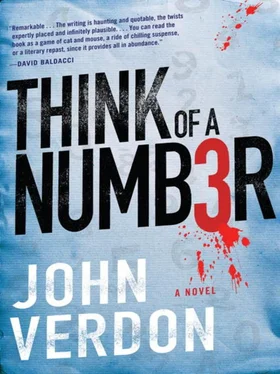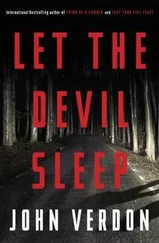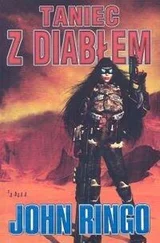“I know what you mean. Yes, I did call them-they’re just not taking the situation seriously. I was hoping a call from you might help. Can you do that for me?”
“Tell me what the note says.”
“Just a second. Here it is. Just two lines, written in red ink. ‘Come one, come all. / Now all fools die.’”
“You read this to the police?”
“Yes. I explained there might be a connection to two murders, and they said a detective would be out to see me tomorrow morning, which doesn’t sound to me like they think it’s urgent.”
Gurney weighed the pros and cons of telling him that there were now three murders but decided that the news wouldn’t add anything except more fear, and Dermott sounded like he already had plenty of that.
“What does the message mean to you?”
“Mean?” Dermott’s voice was panicky. “Just what it says. It says that someone is going to die. Now , it says. And the message was delivered to me . That’s what it means, for Godsake! What’s the matter with you people? How many dead bodies does it take to get your attention?”
“Try to stay calm, sir. Do you have the name of the police officer you spoke to?”
Upside down
By the time Gurney finished a tough phone conversation with Lieutenant John Nardo, Wycherly PD, he’d received grudging assurance that an officer would be dispatched that afternoon to provide Gregory Dermott with protection, at least temporarily, subject to a final decision by the chief.
The snowstorm, meanwhile, had grown into a swirling blizzard. Gurney had been up for nearly thirty hours and knew that he needed to sleep, but he decided to push himself a little further and put on a pot of coffee. He called upstairs to ask Madeleine if she wanted any. He couldn’t decipher her monosyllabic answer, although he should have known what it would be. He asked again. This time the “No!” was loud and clear-louder and clearer than necessary, he thought.
The snow wasn’t having its customary tranquilizing effect on him. The events in the case were piling up too rapidly, and launching his own poetic missive at the Wycherly post-office box in the hope of it reaching the killer was starting to feel like a mistake. He’d been given a degree of investigative autonomy, but it might not cover such “creative” interventions. As he waited for his coffee to brew, images of the Sotherton crime scene, including the flounder-which he pictured as vividly as if he’d seen it-competed with the note on Dermott’s window for space in his mind. Come one, come all. / Now all fools die .
Searching for a route out of his emotional morass, it occurred to him that he could either repair the fractured roof rake or take a closer look at the “nineteen” business to see if it could lead him anywhere. He chose the latter.
Assuming that the deception had worked the way he believed it had, what conclusions could be drawn? That the killer was clever, imaginative, cool under pressure, playfully sadistic? That he was a control freak, obsessed with making his victims feel helpless? All of the above, but those qualities were already obvious. What wasn’t obvious was why he’d chosen to go about it in that particular way. It dawned on Gurney that the outstanding fact about the “nineteen” trick was that it was a trick . And the effect of the trick was to create an impression that the perpetrator knew the victim well enough to know what he was thinking-without requiring any knowledge of him at all.
Christ!
What was that sentence in the second poem sent to Mellery?
Gurney almost ran from the kitchen into the den, grabbed his case file, and riffled through it. There it was! For the second time that day, he felt the thrill of touching a part of the truth.
I know what you think ,
when you blink ,
where you’ve been ,
where you’ll be .
What was it Madeleine had said that night in bed? Was that last night or the night before? Something about the messages being peculiarly nonspecific-having no facts in them, no names, no places, nothing real?
In Gurney’s excitement he could feel major pieces of the puzzle clicking into place. The central piece was one he’d been holding upside down all along. The killer’s intimate knowledge of his victims and their pasts was, it now seemed clear, a pretense. Again Gurney read through his file of the notes and phone calls Mellery and the others had received, and he wasn’t able to find a scrap of evidence that the killer had any specific knowledge of them beyond their names and addresses. He did seem to know that at one time they all drank too much, but even there, there was no detail-no incident, person, place, time. It was all consistent with a killer trying to give his victims the impression that he knew them intimately when in fact he didn’t know them at all.
This raised a new question. Why kill strangers? If the answer was that he had a pathological hatred for everyone with a drinking problem, then why not (as Randy Clamm had said to Gurney in the Bronx) just toss a bomb into the nearest AA meeting?
Again his thoughts began running in a circle, as weariness flooded his mind and body. With weariness came self-doubt. The elation of realizing how the number trick was done and what that meant about the relationship between the killer and his victims was replaced by that old self-critical feeling that he should have realized it sooner-and then by the fear that even this would turn out to be another dead end.
“What’s wrong now?”
Madeleine was standing in the den doorway, holding a bulging black plastic garbage bag, her hair disarranged by her closet-clearing mission.
“Nothing.”
She gave him an I-don’t-believe-you look and deposited the garbage bag at the door. “This stuff was on your side of the closet.”
He stared at the bag.
She went back upstairs.
The wind made a thin whistling sound at a window that needed new weather stripping. Damn. He’d meant to fix that. Every time the wind hit the house at that angle…
The phone rang.
It was Gowacki from Sotherton.
“Yeah, as a matter of fact, it’s a flounder,” he said without bothering to say hello. “How the hell did you know that?”
* * *
The fish confirmation gave Gurney’s sleep-deprived psyche a quick lift out of the pit. It gave him enough energy to call the irritating Jack Hardwick about a point that had been bothering him all along. It was the first line of the third poem-which he extricated from his file as he dialed Hardwick’s number.
I do what I’ve done
not for money or fun
but for debts to be paid ,
amends to be made .
For blood that’s as red
as a painted rose .
So every man knows
he reaps what he sows .
As usual, he had to endure a long minute of random abuse before he could get the BCI detective to listen to his concern and respond to it. The response was typical Hardwick.
“You figure the past tense means the perp already left a few severed heads behind him by the time he knocked off your buddy?”
“That would be the obvious meaning,” said Gurney, “since the three victims we know of were alive when that was written.”
“So what do you want me to do?”
“Might be a good idea to send out an MO inquiry for similars.”
“How detailed you want the modus operandi spelled out?” Hardwick’s arch intonation made the Latin term sound like a joke. His chauvinistic tendency to find foreign languages laughable always got under Gurney’s skin.
“Up to you. In my opinion the throat wounds are the key piece.”
Читать дальше












